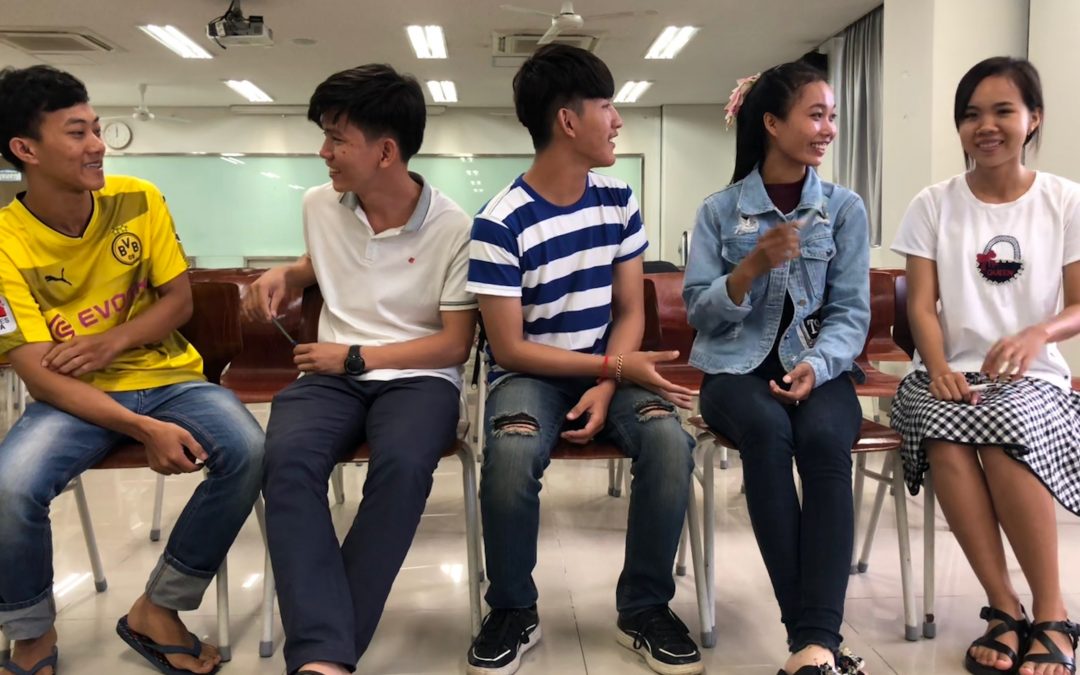New skills are opening up opportunities in emerging engineering sectors.
Despite an early start on this sultry hot Sunday morning, a first floor classroom at Royal University Phnom Penh is packed with students attending a Khmer trainer led workshop on research techniques. Fourth year engineering student Ky Sereyvatanak is there “to learn about research, why conduct it, the steps, and some tips.” The workshop is an initiative of the new Student Support Services Centre established by EWB Australia, the Centre for Sustainable Water, Royal University of Phnom Penh, Institute of Technology Cambodia, and WaterAid, to teach contemporary workplace skills not currently taught at university.
Phorm Nayelim who studies environmental engineering has come because “we have to do a thesis for our degree. At university we aren’t taught how to research and this workshop today is very good to guide us.” Nodding in agreement is Hout Menghour, a geology student who says “I think this is unique because I have been studying from first year till now and I haven’t heard about these techniques before.”
This skills gap is not unique to these students. Following the systematic destruction of the education system during the Khmer Rouge era, the tertiary education sector in Cambodia had to be completely rebuilt, but is challenged to meet the demands of a dynamic employment market. Fatima Shehata, a former EWB Australia Field Professional now supporting this initiative as part of her Knowledge Management role with the Centre for Sustainable Water, explains that the construction sector is booming in Phnom Penh but foreign companies bring in their own staff rather than employing local engineers. “Consistently the feedback that the entire sector was getting is that there aren’t enough people going into the tech sector, and when those that do graduate, they don’t have the employment or soft skills that they need to do the jobs.”
“Employers are looking for engagement, presentation and facilitation skills,” she says “English in terms of reporting and speaking, time management, as well as creative thinking and knowledge of the sectors that they are going in to. What we would call workplace readiness.” A response to this need for greater workplace readiness, the new centre already has over 100 registered students and enjoys strong support from Royal University of Phnom Penh and Institute of Technology Cambodia because “from the very beginning,” Fatima says “they were talking about what skills they wanted to improve in their students, and the different challenges they were facing.” Pon Sopheany having taken the morning’s workshop is feeling very positive and says “At school we only study technical skills, and with this program it is very good because it gives many soft skills.”
This centre is just one initiative spearheaded by EWB Australia’s Engineering Education Program (EEP) in Cambodia and Timor Leste, which builds capacity and opportunity in the engineering sector through professional skills development. “I think the Student Support Services Centre is a great example of how we try to bridge the gap between fresh graduates and the employment market,” says Romina De Jong who runs EEP in Cambodia. “What we hear from many employers,” she says “is that many graduates are not ready to start working as a professional so there is a lot of on the job training. On the other hand students say they find it very difficult to find an employer, and to understand how their study connects to job opportunities.”
In tandem with local community organisations, EEP brokers internships, facilitates mentoring, and runs Design Challenges, all with the aim of preparing and matching graduates to skilled work, so the local engineering sector can function well. EEP’s longest running program Design Challenge, teaches Human Centred Design to university students through community identified projects. Working with community organisations such as Agile and Habitat for Humanity, the students have to develop designs that put the community at the heart of the solution “Together we make sure we get a design statement that is really derived from the community that they work with.” says Romina, and by involving the community organisations as co-facilitators, these design skills can be transferred even more broadly.
Timor Leste’s engineering sector faces similar challenges, so building up work ready skills means the local sector can better meet and to manage its own skills needs. As EEP coordinator in Timor Leste, Francisco Dos Reis believes the positive results from the internship program speak for themselves. Seven young people have now graduated from a dedicated technical and project management internship program with CNEFP, Timor’s National Centre for Employment and Professional Training. Meanwhile Petroleum Engineer Gilberto Alves secured full time employment with Heineken following an internship initiative with Plan International, WaterAid and CHL. Gilberto was also mentored by an operations manager with oil and gas company Caltex, organised by EWB Australia. “He helped me to write a cv,” he says “and to prepare job applications and he coached me for interviews.”
Gilberto believes these were crucial in building the skills and confidence he needed to secure his engineering role. “The most important thing is to get a start. The internship is a really good opportunity for the fresh graduate because we don’t know how to get a job, and if you want to be successful in getting a position you have to have some experience.”
Francisco has seen firsthand how much Gilberto took from the experience. “When he joined, he was really shy, so when he got the job I said to him, you succeeded because of your commitment!” Gilberto smiles in agreement “It made me believe that I could work in a real company,” he says and adds a piece of advice that sums up the spirit of the EEP program “You have to have commitment, because then even if you try and fail, you will try again.”
In 2017-2018 The EEP program ran 15 Internships and 15 professional workshops, and 7 CNEFP graduates have been trained and mentored.


